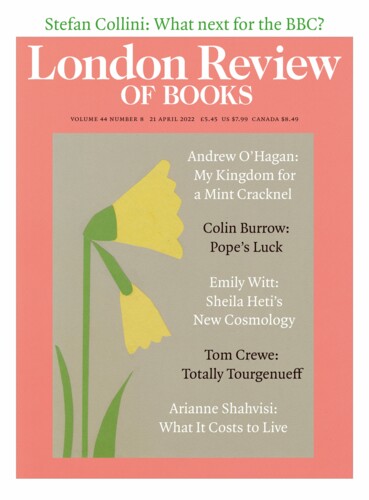‘The idea really came to me the day I got my new false teeth,’ George Orwell’s Coming Up for Air begins. Two paragraphs later, we learn that the narrator is forty-five years old. In 1984, Winston is surprised at Julia’s advances: ‘I’m thirty-nine years old. I’ve got a wife that I can’t get rid of. I’ve got varicose veins. I’ve got false teeth.’ And in Keep the Aspidistra Flying, an even younger Gordon Comstock glumly evaluates his life: ‘thirty years old, with twenty-six teeth left; with no money and no job; in borrowed pyjamas in a borrowed bed; with nothing before him except cadging and destitution, and nothing behind him except squalid fooleries.’ It’s not so much an oral fixation as a sign of the times. Teeth were hard to keep, especially if you were poor. In The Road to Wigan Pier, Orwell reads the teeth of working-class people in the industrial north.
Arianne Shahvisi
Arianne Shahvisi is a senior lecturer in ethics at Brighton and Sussex Medical School. Her book Arguing for a Better World was published in June 2023.
Short Cuts: What It Costs to Live
Arianne Shahvisi, 21 April 2022
Erwin Schrödinger is best known for his cat, suspended in a state of being both dead and alive. Less well known is ‘Schrödinger’s paradox’, which describes the apparent contradiction between life and the second law of thermodynamics. The second law rules that the entropy – usually glossed as the measure of disorder – of an isolated system...
Boris Johnson and Rishi Sunak have apologised, but the transgression is so layered that it’s unclear what exactly they claim to be sorry for. Some critics have focused on the importance of the ‘rule of law’, but the law is a poor proxy for morality. (Saving a drowning asylum seeker is, on any reasonable account, the right thing to do, but Johnson’s government recently made it illegal.) Breaking lockdown rules was immoral because there were real risks that doing so could spread the virus, causing illness, death and strain on the health service. High profile violations could undermine future public health measures whose efficacy hinges on widespread compliance. And Johnson has for months firmly and repeatedly denied any knowledge of the parties.
Those of us who sometimes imagine the freedom of being fifteen again have forgotten that being fifteen means going around in a body you hate: a body that seems misshapen, that people might laugh at; a body that smells, sometimes; that sprouts unwanted hair. Even worse if it’s a body that menstruates, cramping and gushing and threatening to leave mortifying stains on upholstery. Worse still if it’s a racialised body, distant from white ideals of beauty, more vulnerable to slurs and violence, less liable to be protected from harm.
According to her daughter, Ève Curie, when the young Maria Skłodowska was a student in Paris in the 1890s she was often so cold in her garret room that she’d put her wooden chair on top of her blanket as she tried to sleep to give herself ‘some sort of illusion of weight and heat’. Reading of Marie Curie’s austere beginnings made me feel better about growing up in a house that was always cold.
Read anywhere with the London Review of Books app, available now from the App Store for Apple devices, Google Play for Android devices and Amazon for your Kindle Fire.
Sign up to our newsletter
For highlights from the latest issue, our archive and the blog, as well as news, events and exclusive promotions.


